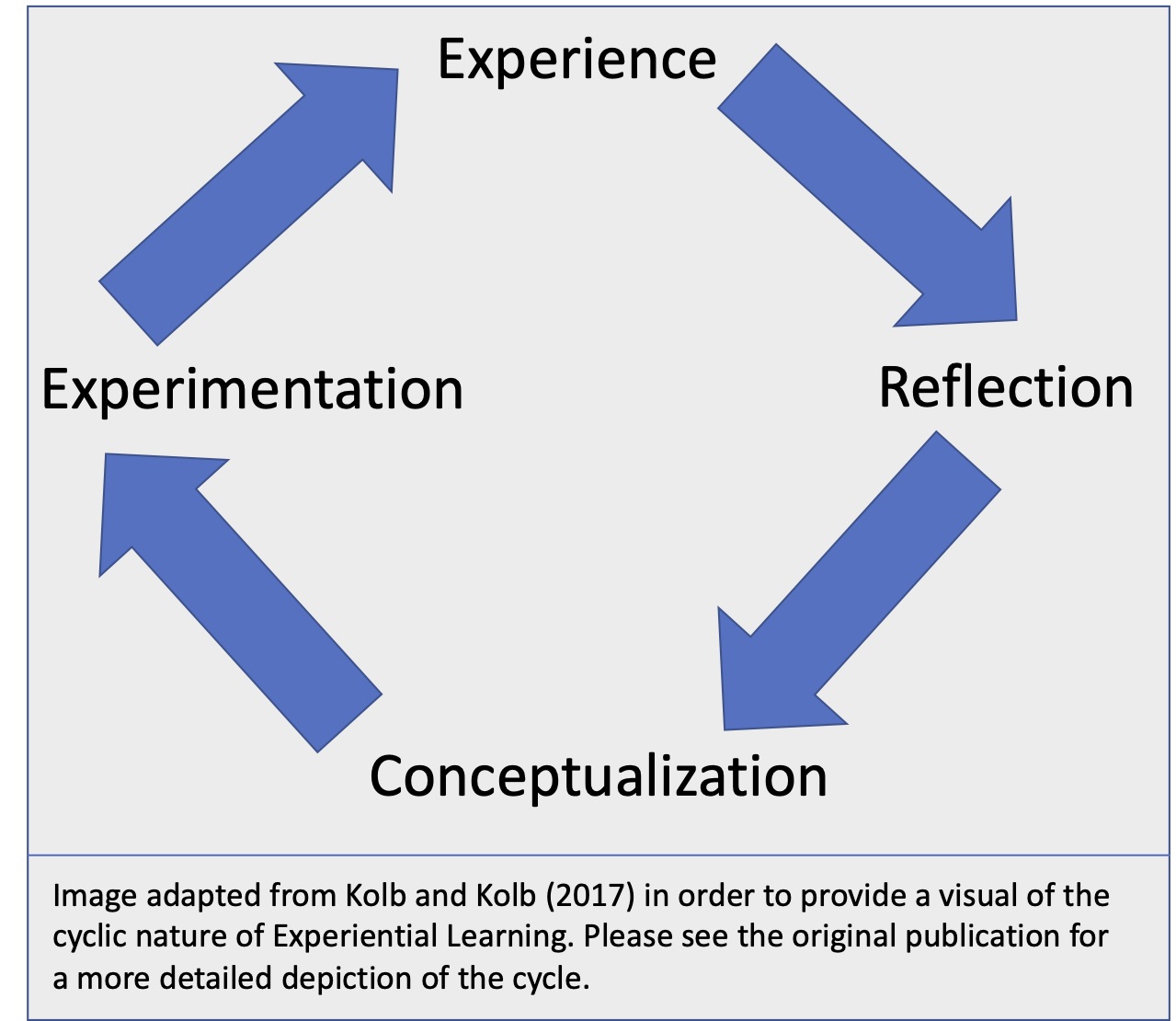The Experiential Learning Cycle or sometimes also called The Experiential Learning Model was developed in 1974 by Kolb. This model shows learning as a cyclic process of 1) concrete experience, 2) reflective observation, 3) formation of abstract concepts and generalizations, 4) testing implications of concepts in new situations (active experimentation) (Kolb, 1974; Kolb and Kolb, 2017).
Kolb and Kolb (2017) credit many scholars as informing Experiential Learning. These
scholars include: John Dewey, William James, Jean Piaget, Kurt Lewin, Lev Vygotsky,
Carl Rogers, Paulo Freire, Carl Jung, and Mary Parker Follett.
Experiential Learning Theory (ELT) views learning as a holistic process of human adaptation (Kolb and Kolb, 2017). In understanding learning in this way, it begs us to de-contextualize learning, to broaden our definitions to include adaptation in all environments (not limited to formal learning environments). Experiential learning is truly a cycle of action and reflection. In this, it shares many features with Action Research and one can see why Kolb may credit Kurt Lewin as one of the founding fathers.
The cyclic nature of experiential learning challenges the traditional modes used in didactic education because rather than the flow of information being unidirectional from the educator to the learner, the experience is one shared by learner and educator. All develop a relationship and all are teachers and learners. Educators may move fluidly in roles of: facilitator, coach, subject expert and standard setter/evaluator. Likewise, students may move into these roles. Experiential learning develops learner autonomy (Gorghiu and Santi, 2016).
There are many applications of experiential learning. However, in order to be true experiential learning, the application has to utilize the cycle. That is, learners must have the opportunity to not only have a concrete experience (e.g. an internship) but to also reflect on that experience, form generalizations about it and then actively experiment with those generalizations. Thus, an experiential learning course could be built around case studies but would need to integrate all of the elements of the cycle.

A note on Learning Styles
While the idea that individual learners have their own unique learning style has been popularized, this notion that learning style is “trait-based” (Kolb and Kolb, 2017) can be harmful because learners come to believe that they can only learn in certain ways. They may even pressure professors by saying, “I am a visual learner and therefore can only learn if you teach me this way.” This can promote a fixed mindset (Dweck, 2007) and preclude learner growth. Kolb and Kolb (2017) explain learning style as a function of process and offer a much more metacognitive, growth-minded approach to investigating learning styles.
Experiential Learning in Online Education
Experiential learning is highly suited to the at-a-distance or online learning environment. We often put students into a lab and ask them to imagine how observed phenomena work in nature. When we teach at-a-distance, we have the opportunity to allow students to observe and experience nature and then imagine how scientists might try to mimic this in a lab (credited to LAMP Fellow, Richard Vercoe). When students are learning at-a-distance, immersive experiences outside of the classroom are very accessible; our instruction can then build in the cycle of reflection, conceptualization and experimentation.
Gorghiu, G. & Santi, E.A. (2016) Applications of Experiential Learning in Science Education Non-Formal Contexts. The European Proceedings of Social & Behavioural Sciences. eISSN: 2357-1330. http://dx.doi.org/10.15405/epubs.2016.11.33 .
Kolb, D.A. (1974). “On Management and the Learning Process,” in Kolb, Rubin, and McIntyre (eds.) Organizational Psychology: A Book of Readings. Englewood Cliffs, NJ: Prentice-Hall.
Kolb, A.Y. & Kolb, D.A. (2017). Experiential Learning Theory as a Guide for Experiential Educators in Higher Education. Experiential Learning & Teaching in Higher Education. 1(1). Article 7. Available at: https://nsuworks.nova.edu/elthe/vol1/iss1/7
